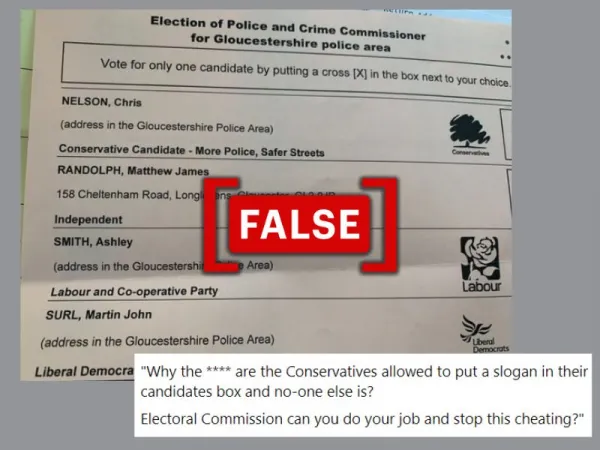By: Umme Kulsum
June 13 2024
 Screenshot of posts claiming only the Conservatives are allowed to put a description in their candidate’s box on a ballot paper. (Source: Facebook/Modified by Logically Facts)
Screenshot of posts claiming only the Conservatives are allowed to put a description in their candidate’s box on a ballot paper. (Source: Facebook/Modified by Logically Facts)
In the UK, all political parties can optionally add a description under their candidates' names on ballot papers, not just the Conservative Party.
What’s the claim?
Users on Facebook are sharing an image of a ballot slip for the May 2024 police and crime commissioner elections in Gloucestershire, a ceremonial county in South West England. The image shows that, among the four candidates, only the Conservative Party candidate included a description or slogan under its name, reading, "More Police, Safer Streets."
The remaining three candidates, representing Labour, the Liberal Democrats, and an independent candidate, do not have any slogans alongside their party labels. This has led to allegations that the description option is exclusive to the Conservative Party, questioning the fairness of the Electoral Commission.
A Facebook user sharing the image wrote, “Why the **** Are the Conservatives allowed to put a slogan in their candidates box and no-one else is? The Electoral Commission can do your job and stop this cheating (sic).”
Another Facebook user wrote, “Just received my ballot papers for postal voting in the local elections. Can anyone explain to me how this is permitted? “Conservative Candidate - More Police, Safer Streets” Do different rules apply to Conservatives? (Rhetorical question!). Why can’t people play fair on the very basics (sic)?" This post had over 50 likes and over 80 comments at the time of writing this story.
The image has gained widespread traction on X (formerly Twitter), with over 300,000 views, all with the same narratives. Archived versions of such posts can be found here and here.
Screenshot of claims made online. (Source: X/Facebook/Modified by Logically Facts)
However, adding a description on the ballot papers is an optional symbol that a party can register alongside their name to appear on the ballot paper.
What we found
According to the U.K. Electoral Commission, the party descriptions on ballot papers are to be registered while registering a party, and they are optional identity markers in addition to party names, with up to 12 descriptions allowed per party. These descriptions can substitute the party name on most ballot papers but must clearly identify the party to voters and must differ from party names.
Screenshot of explanation by the Electoral Commission about ‘Party descriptions on ballot papers.’ (Source: The Electoral Commission)
In response to a post on X (archived here) sharing the viral image, the U.K. Electoral Commission replied on April 16, 2024, "Political parties can register descriptions, as well as their party name. A description is an optional identity mark which can be used instead of the party name on most election ballot papers, including for local elections.”
It's worth noting that other candidates also have descriptions added. For instance, Steve Lodge, a Liberal Democrat candidate for Police & Crime Commissioner in Devon and Cornwall, has the description: "For a fair deal."
This confirms that ballot paper descriptions are not exclusive to the U.K.'s Conservative party; all parties in the U.K. have the option to register descriptions which are not mandatory.
The verdict
The Electoral Commission permits all political parties in the U.K. to add a description on the ballot papers. Therefore, we have marked this claim as false.